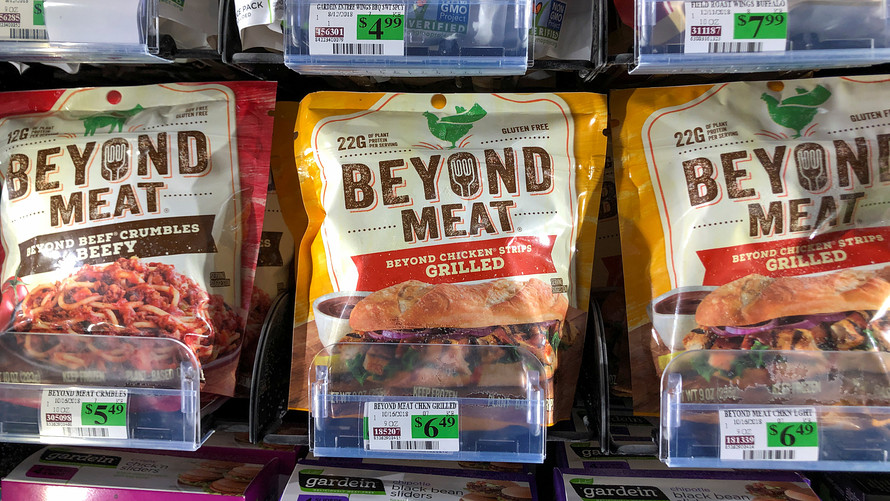An earlier version of this report incorrectly said that Impossible Meat is sold at Whole Foods. It has been corrected.
 Reuters
Reuters
Beyond Meat has diversified its sources of revenue and is no longer as dependent on Amazon.com Inc.s Whole Foods to distribute its plant-based protein products, the company argues in response to U.S. SEC questions about changes in its reporting practices.
The SEC earlier questioned why disclosures regarding the biggest distributors of the company’s products that were included in its preliminary initial public offering documents were later dropped from filings published on the regulator’s Edgar platform.
“Please explain why you no longer intend to file such agreements as exhibits and why you have removed some of the related disclosures,” the SEC had earlier asked in a letter dated November 1, 2018.
The SEC and Beyond Meat went back and forth six times on the company’s draft filing which was filed confidentially. Beyond Meat replied to say that it had determined that its business was no longer “substantially dependent” on any individual contract with a distributor.
In particular, the company is no longer overly dependent on Amazon.com Inc.’s Whole Foods to sell its plant-based protein products with sales at the supermarket chain shrinking to 2% of gross revenue in the third quarter of 2018 from about 10% for all of 2017
In 2017, its biggest distributors—United Natural Foods UNFI, +0.67%, KeHE Distributors LLC and DOT Foods Inc., — accounted for 30%, 10% and 10% of gross revenue respectively, and another distributor accounted for 14% of gross revenue in the nine months ended Sept. 29, 2018.
“These agreements are short-term, non-exclusive, may be canceled with short notice and do not provide for minimum purchase commitments by any distributor,” the law firm Orrick, Herrington & Sutcliffe admitted in response to the SEC on behalf of Beyond Meat.
But the company believes that if the relationship with the four distributors were terminated, it would still be able to sell its products elsewhere, including to restaurants and to food service companies. Beyond Meat has deals with a range of restaurant chains, including Dunkin’ Brands DNKN, -0.54%, Del Taco and TGIF.
The contract with Whole Foods AMZN, -0.46% is also no longer as significant for Beyond Meat, “in part due to the company’s ongoing and significant revenue growth,” says the letter.
Whole Foods plans to start selling products made by privately held U.K. company, The Meatless Farm, next month.
For more on this, read: Britain’s answer to Beyond Meat set to launch in the U.S.
The SEC was also irked by one of the metrics used Beyond Meat in its IPO documents that it calls “earned media impressions,” or EMI. The company defines EMI as “the amount of exposure that a piece of content in a television show, newspaper, website, blog or other form of media receives based on the readership or viewership for that particular media.”
Beyond Meat has used social media and celebrity endorsements heavily as it first began to grow and market its business. Stars including Leonardo DiCaprio and Jessica Chastain have helped it spread its vegan message. The company maintains that EMI “reflect interest in our products, our products’ or brand’s relevance to the media, the audiences they service and the overall positioning of our products in the marketplace,” according to its prospectus.
Read now: Beyond Meat goes public with a bang: 5 things to know about the plant-based meat maker
But the SEC was not convinced.
“If you retain disclosure relating to “earned media impressions,” please provide enhanced disclosure to clarify the nature of the nexus between that metric and your results of operations or to make clear that there is none,” it says in the letter.
In response, the company argued that EMIs “gauge brand awareness,” which it says are a key part of its growth strategy.
“The company believes that EMI is recognized across a range of consumer products industries as a useful metric for gauging brand awareness, general consumer exposure to a company’s brand and organic consumer interest,” says the letter.
Beyond Meat shares were down about 10% Tuesday, after the company unveiled plans for a secondary offering of 3.25 million shares as it reported second-quarter earnings late Monday.
See now: As Beyond Meat soars, Conagra sees $30 billion opportunity in Gardein plant-based meat alternatives
The company said that sales nearly quadrupled from a year ago, but reported a second-quarter loss of $9.4 million, or 24 cents a share, on sales of $67.3 million, after losses of $7.4 million on revenue of $17.4 million a year ago.
Earnings before interest, income taxes, amortization and depreciation, and adjusted to strip out stock-based compensation and other expenses, came in at a gain of $6.9 million. Analysts on average expected the company to report losses of 9 cents a share on revenue of $52.5 million, according to FactSet.
The stock has been on a tear since its May IPO and was last trading at $200.44, or eight times its IPO price of $25.
The S&P 500 SPX, -0.17% has gained 2.2% in the last three months, while the Dow Jones Industrial Average DJIA, -0.02% has gained 2.1%.
Additional reporting by Jeremy Owens in San Francisco
Read now: Beyond Meat at risk as competitors like Impossible Burger take root











